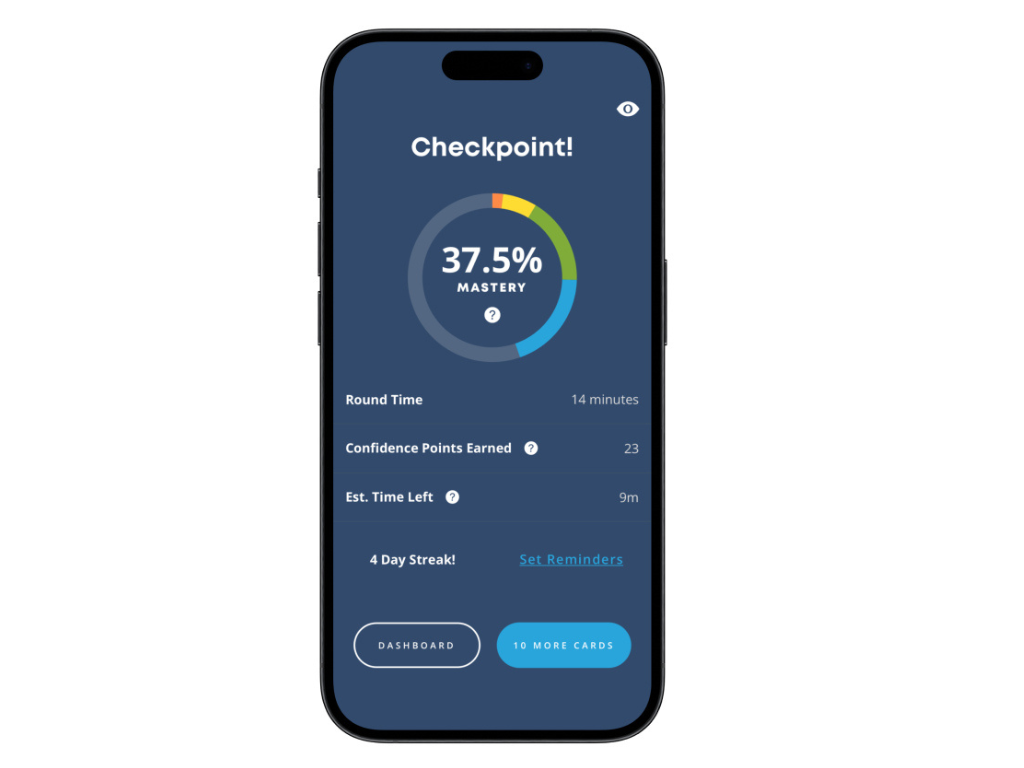Few phenomena have changed digital media this decade as much as cards.
As Robert Fan wrote earlier this year, the advent of the mobile “card” is slowly transforming nearly every consumer web and mobile industry on the planet. There’s simply something so darn consumable about the combination of text, images, video, audio, meta tags, likes, shares, and comments into a single unit of meaning.
Naturally, cards—and specifically online flashcards—are revolutionizing learning.
In this article, we’ll explain why online flashcards are the future of studying and an essential remote teaching resource.
The "Cardification" of Everything
We’ve recently seen a huge influx of card-based products. These include everything from Tinder (dating) and SlideShare (corporate white papers), to Instagram (photos), Pinterest (pinboards), TikTok (swipable mini-videos), and Google Now (real-time personalized information). These products have improved millions of lives while creating billions for investors.
But EdTech is only just beginning to be transformed by cards. Brainscape predicts that online flashcards will be among the most important disruptors of Education for the next millennium.
Online Flashcards in Education
Flashcards have come a long way from the dreaded stacks of index cards we all abandoned under our beds. Modern flashcards like Brainscape are now able to accomplish so much more.
They’re no longer just "drill & kill" tools for memorizing trivia. Today’s digital flashcards handle any media, any length, any subject—all while adapting to your learning speed with smart, personalized repetition.
It’s like having a tutor in your pocket—minus the awkward small talk.
Online flashcards can also be made adaptive so that they are automatically repeated in intervals that are customized for the learner’s own pace of personalized learning.
Brainscape takes this to the next level. We built an app from cognitive science research to optimize learning in digital flashcards. We combine the effectiveness of active recall with metacognition and spaced repetition to accelerate memory retention. The result is the most effective study and learning tool that you'll find online.
You never have to think about what to study. Simply open the app, hit 'Study', and Brainscape will show you cards right in your ideal learning zone.

FAQ: Why Online Flashcards are the Future of Studying
Why are flashcards good for studying?
Flashcards work because they use active recall, which forces your brain to retrieve information rather than just recognize it. This strengthens memory retention and improves long-term learning, especially when paired with strategies like spaced repetition.
Are online flashcards effective?
Yes, especially when they’re designed with cognitive science in mind. Online flashcards can adapt to your learning pace, include multimedia content, and be studied anywhere, making them far more powerful and flexible than traditional paper cards.
What are the benefits of digital flashcards?
Digital flashcards such as Brainscape's flashcards are portable, customizable, and track your progress automatically. They support images and audio, making it easier to personalize your study and focus on the material you struggle with most.
What does research say about flashcards?
Studies consistently show that flashcards are highly effective when used with active recall and spaced repetition. These evidence-based techniques help learners retain information longer and reduce the total time needed to master new material.
Online Flashcards and the Future of Studying
For the next millennium, the word “flashcard” does not have to mean “trivial fact” or “vocab memorization” but rather “the smallest unit of knowledge that can be efficiently studied, shared, or tied across various curricula.” You'd be surprised at the thousands of ways that educators transform rich media into bite-sized question & answer retrieval practice.
Brainscape is proud to have entered this new industry of mobile study tools. We realize that so much of the permanent solidification of knowledge happens during the study process, and we are committed to creating the most effective flashcard-based study experience for students and teachers alike. Brainscape is quickly emerging as the web & mobile study tool used by serious learners.
In contrast to websites like Quizlet, which have successfully created vocab-based flashcards and games to make learning more fun, Brainscape has applied decades of cognitive science research to improve learning outcomes for large learning objectives over the course of a lot of time.
Brainscape’s multimedia flashcards use a smart, adaptive algorithm to optimize students’ pace of learning while providing teachers and administrators with detailed reports on students’ study progress. The future of education is data-driven, after all.

More importantly, flashcards can be easily integrated into larger "real-world" instructional formats. You can link to your flashcards from any other website or learning management system so that they can represent the ultimate supplementary resource to your curriculum.
The FREE Brainscape flashcard library already contains well-organized flashcard curricula for over 1 million subjects, created by the world’s best publishers, professors, teachers, and top students.
Plus, you can make your own cards or use our custom AI to turn study notes into flashcards within minutes!
If you want to learn at the cutting edge of educational technology, try out Brainscape! It's free. You'll thank us later.
Additional Reading
- The Complete Guide to Making & Studying Flashcards Online in 2025
- Are Flashcards Effective for Studying?
- How to make money by selling your flashcards online
References
Fan, R. (2015, February 27). How cards are quietly transforming the web. TechCrunch. https://techcrunch.com/2015/02/27/cards-transforming-web/
Serfaty, J., & Serrano, R. (2020). Examining the potential of digital flashcards to facilitate independent grammar learning. System, 94, 102342. https://doi.org/10.1016/j.system.2020.102342
Zung, I., Imundo, M. N., & Pan, S. C. (2022). How do college students use digital flashcards during self-regulated learning? Memory, 30(8), 923–941. https://doi.org/10.1080/09658211.2022.2058553
